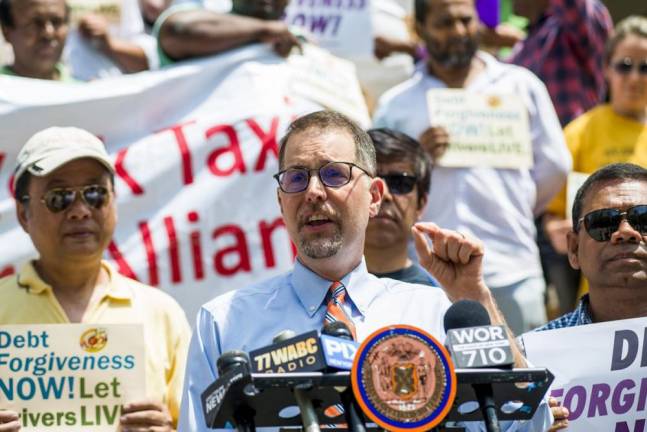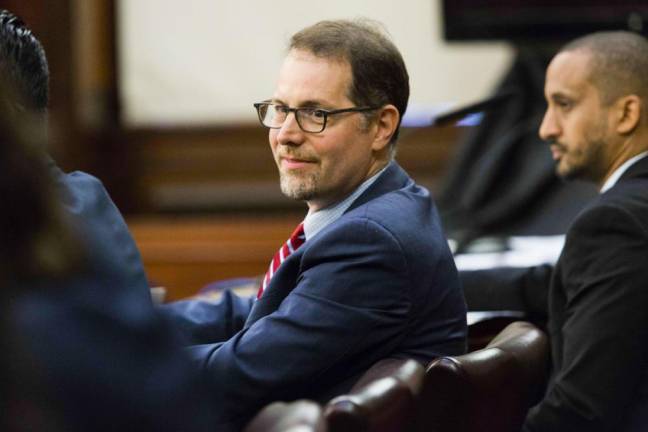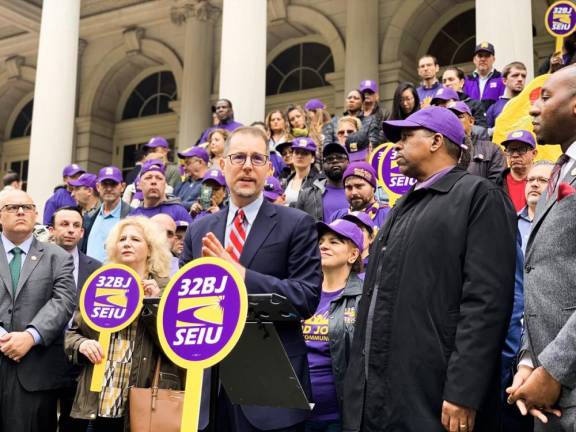Levine Launches Run for Borough President
Council Member showcases record on affordable housing, public health as he announces his campaign



Council Member Mark Levine announced his candidacy to become the next Manhattan borough president last week, touting a record of fighting for affordable housing as a key credential.
“The future of the borough is on the line in 2021,” said Levine, 50, whose district encompasses Morningside Heights and Hamilton Heights, in an interview with Our Town. “The neighborhoods of this borough have enormous challenges, and this is an incredibly important job in determining the future of Manhattan.”
With his announcement, Levine joins fellow Democratic council member, Ben Kallos, in the race to succeed term-limited BP Gale Brewer. Both candidates are running on progressive platforms, including the promise not to take money from real estate companies. When asked what — if anything — might set the two apart, Levine said he would not speak negatively about his opponent.
“I am not to speak badly about anybody,” said Levine. “I am incredibly proud to represent one of the most diverse districts in New York City, and that won election twice there, and to have built at every stage of my political career coalitions which are as diverse as this borough and city. That's what we need to represent the fabulous diversity of this borough. That's who I am. That's what my campaign will be.”
"Right to Counsel" Law
Levine pointed to two pieces of legislation that he views as some of the most important work in which he has a hand since being elected to the City Council in 2014: a ban on flavored e-cigarettes passed last year and creating a “right to counsel” for those facing eviction.
“In my role as health chair, a major victory that we just won against big tobacco was move to protect the children of this borough from addiction to e-cigarettes,” said Levine of the legislation the council passed after multiple deaths across the country related to a lung illness linked to vaping. “We got the bill up against the full for ourselves corporate lobby. I’m not afraid to take on tough fights like that. I’ve won my fair share.”
Likewise, he said the legislation guaranteeing tenants facing eviction the right to counsel has been instrumental in lowering the number of evictions in the city. According to Levine, evictions have dropped by 38 percent since the law went into effect in 2017.
“This has been a game change for tenants in the midst of an epidemic of evictions, fueled by the fact that almost no tenants historically have had attorneys and every landlord has,” said Levine. “You don't need a law degree to understand that has been terrible for tenants. We made New York City the first place in America to change that. Newark, San Francisco, Cleveland, Philadelphia, have now passed similar legislation.”
The right to counsel legislation, Levine said, helps keep families in their homes, which he noted is incredibly important at this moment while the city deals with a homelessness crisis.
“The worst homeless crisis since the Great Depression is happening in a good economy,” said Levine. “And we should all be scared about what that crisis will look like in the next recession.”
Housing for 'Regular New Yorkers'
He said more affordable and supportive housing needs to be built specifically for the homeless population in mind. In doing so, he said, the city also needs to rethink how it deals with large-scale development and how it affects the city’s neighborhoods.
“We have an affordable housing shortage but there's a right and wrong way to develop,” said Levine. “We need to develop in ways that are consistent with the scale and character and the history of neighborhoods. These hundred story towers on millionaire's row are providing no housing to regular New Yorkers.”
He said these towers also pose a threat to the city’s green spaces by casting long shadows and, in turn, changing the ecology these spaces, including Central Park.
“On a cold day, you'll see it. Everyone congregates to the sun and the shady parts of the park are empty,” said Levine. “But what happens if the entire southern part of the park is in a shadow?”
He said as borough president he would introduce new zoning rules that would prevent development from blocking out the sun around the city’s parks.
Bus Transit "Death Spiral"
Another key initiative Levine said would be a focus of his tenure if elected would be improving the city’s bus transportation.
“This shouldn't be a borough where it's faster than to walk than to take a bus. Bus transit right now is on a death spiral. Usership is dropping,” said Levine. “People are getting off the bus and into cars, which only makes traffic worse.”
One part of improving this, Levine said, would be to implement technology that would turn red lights green when a bus approaches an intersection, which would speed up travel time.
So far, Levine has received the endorsements from district leaders across the borough, as well as Council Member Margaret Chin and Assembly Member Al Taylor. Both said Levine was a great collaborator on policy issues.
In making the case for his own candidacy, Levine said his approach to public service is informed by what he learned when he began his professional career as a public school teacher in the South Bronx and his interactions with students.
“So much of my career now and all the service can be traced to those years in the classroom,” Levine said. “It’s given me a profound understanding for how difficult teaching is. It's only shaped who I am as an elected official.”
"There's a right and wrong way to develop. We need to develop in ways that are consistent with the scale and character and the history of neighborhoods." Council Member Mark Levine